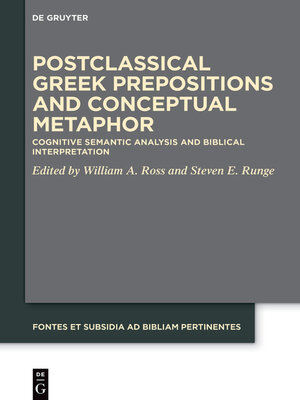Postclassical Greek Prepositions and Conceptual Metaphor
ebook ∣ Cognitive Semantic Analysis and Biblical Interpretation · Fontes et Subsidia ad Bibliam pertinentes
By William A. Ross

Sign up to save your library
With an OverDrive account, you can save your favorite libraries for at-a-glance information about availability. Find out more about OverDrive accounts.
Find this title in Libby, the library reading app by OverDrive.



Search for a digital library with this title
Title found at these libraries:
| Library Name | Distance |
|---|---|
| Loading... |
Traditional semantic description of Ancient Greek prepositions has struggled to synthesize the varied and seemingly arbitrary uses into something other than a disparate, sometimes overlapping list of senses. The Cognitive Linguistic approach of prototype theory holds that the meanings of a preposition are better explained as a semantic network of related senses that radially extend from a primary, spatial sense. These radial extensions arise from contextual factors that affect the metaphorical representation of the spatial scene that is profiled. Building upon the Cognitive Linguistic descriptions of Bortone (2009) and Luraghi (2009), linguists, biblical scholars, and Greek lexicographers apply these developments to offer more in-depth descriptions of select postclassical Greek prepositions and consider the exegetical and lexicographical implications of these findings. This volume will be of interest to those studying or researching the Greek of the New Testament seeking more linguistically-informed description of prepositional semantics, particularly with a focus on the exegetical implications of choice among seemingly similar prepositions in Greek and the challenges of potentially mismatched translation into English.







